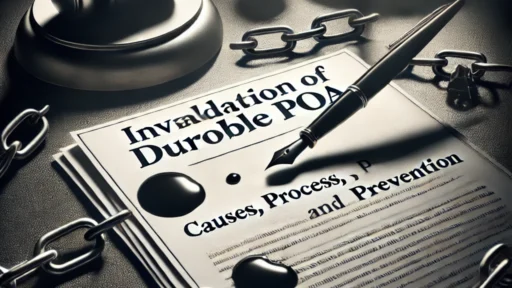Legal documents are often so hard to read that getting through them is like being lost in a labyrinth. One of such complex but important documents is a power of attorney that provides a person with the legal authority to act instead of some other person.
The power of attorney witness is a very important part. Nonetheless, what responsibility does this person have to play? What are they doing to be there? This post will answer these queries while showing the relevance of a power of attorney witness in the law field.
So, if you are on the side wanting to create a power of attorney or you have decided on being a witness, this writing shall be of use to you as it explains in detail the duties, obligations, and legal consequences that might ensue from the contract.
Understanding the Concept of Power of Attorney
A Power of Attorney is a vital legal paper which allows one person to act on behalf of another. You have to know fully how this concept works to avoid problems arising from handling legal, financial, and health-related issues.
Role and Responsibilities of a Power of Attorney
Utilizing a power of attorney, the principal, an individual, entrusts another person, described as the agent or attorney-in-fact, with the power to make the principal’s decisions if the principal is not able to do the same. In the simplest terms, this is akin to assigning your attorney the full power to act on your behalf from the most trivial daily chores to the most essential matters like permitting a surgeon to perform a surgery to highly intricate legal work that may require your presence.
By accepting these obligations, the representative guarantees to the principal the fiduciary duty, which is the obligation to act in the best interest of the principal. It is absolutely necessary for agents to refrain themselves from having any conflicts of interest, act within their scope of authority, and keep correct and full records of all their financial transactions. An important aspect to be understood here is that the agent’s failure in these duties is likely to attract harsh legal effects that should be a matter of concern.
Importance of a Witness in Power of Attorney
The role of a witness in the process of executing a power of attorney is often seen as a cornerstone, building a fortified wall around the legality of this potentially influential document. This section sheds more light on why witnesses are indispensable components of this legal procedure.
Legal Requirements for the Witness
A witness to the power of attorney wields very high position and their functions are deeply deep-rooted in a strict list of legal criteria. To begin with, the witness must be of an age of 18 or more, which is generally the legal age for making contracts in most states. It should be mentioned that a power of attorney witness falls under the same age requirement much as witnessing the execution of a power of attorney does.
Furthermore, a power of attorney witness must be sane, and be able to understand the effects of what he is doing. The act of just being an adult is not enough if the person is mentally incapacitated which prevents him from being a reliable and competent witness.
Involved parties, like the principal, the agent, or their spouses, should not be witnesses. This prevents potential conflicts of interest and the seedbeds for future disputes.
Last but not least, the law stipulates that there be at least two witnesses. This doubles down on the credibility of the process, creating a sturdier legal bulwark around the power of attorney.
How Can a Witness Enhance the Validity of Power of Attorney?
Witnesses, while silent spectators on the face of it, are the voice of assurance that buttress the validity of a power of attorney. In their presence, the official signing of the document transpires. They document this event by affixing their signatures, effectively corroborating that neither force nor fraud played a part in establishing a power of attorney.
From the evidence, their approval can be considered as a trustworthy indication that the principal understands what a power of attorney is and gives it willingly with a clear mind.
Moreover, a witnessed signing ceremony creates a barrier to fraudulent acts, thus putting off the offender from easily defrauding others through the falsely executed power of attorney. The completion of this procedure emphasizes the person who acts as the key figure in the situation since this is the one that brings the power of attorney into a legal form.
Therefore the witnesses are crucial in validating the authority of the power of attorney documents and making sure that they can be carried out by the law, thus giving them a certain undeniable status.
Choosing the Right Power of Attorney Witness
A careful evaluation is needed to single out a person as the perfect candidate for a power of attorney witness. Characteristics such as trustworthiness, non-partisanship and legalities play a great part in making this vital choice.
Qualities to Look For in a Witness
An appropriate witness for a power of attorney should be someone who is reliable and truthful and so full of insight into the matter they will manage. That’s of the essence that a witness of this kind must be objective and unbiased, but still capable enough to declare the principal’s comprehension and willingness in the appointment of an agent.
Moreover, a properly chosen witness is also an embodiment of confidence such as regularity in terms of presence, making sure he/ she will not miss the signing and future legal proceedings. Competence, secondly, is a very important factor because a witness who interprets absolutely correctly, he/she being totally sane and mentally clear at that time, without any kinds of disorders is a must to ensure that he/she is really a reliable witness to the situation.
An ideal witness is also old enough to be legally called a witness, in other words, they must be 18 years old or older. A witness also should not have any relation with those involved in the case, which will further prevent any potential conflict of interest or the appearance of bias.
Red Flags to Avoid When Selecting a Witness
Acknowledging positive characteristics in potential witnesses is necessary, just as it is important to realize warning signs at the same time. A significant warning sign includes any perceived bias by the would-be witness towards the principal or the agent. A biased witness undercuts the impartiality of the process and potentially invalidates the power of attorney document.
Additional alerts are legal restrictions—for instance, a witness who’s under 18 years or related to the involved parties doesn’t meet the legal requirements, and thus, could endanger the validity of the power of attorney. The chance of an unreliable witness, for example the one who agreed on a time of a meeting and never showed up, is the biggest risk.
Finally, if a potential witness talks to the point that he/she is never able to understand the process, or suffers from a mental illness, then it is a bad thing. Understanding the matter is extremely important for the person to be able to state their views and also to confirm the principal’s soundness of mind while signing the power of attorney.
The Process of Witnessing a Power of Attorney
The witnessing of power of attorney requires precision, where it is not so simple as it looks at first sight. It is a process which is conducted very carefully, which implies every bit of detail to be observed. in order to understand all the steps of the process and potential obstacles and at the same time, figure out the best ways to overcome them.
Steps Involved in the Witnessing Process
At first, the witness watches the principal—the grantor of the power—sign the document. With the witness there, the principal swears that they are freely performing the power without any duress or influence.
Following this, the witness signs the document as an attestator. By signing, the witness confirms that he or she has personally observed the principal who has signed the document voluntarily and acknowledges that the principal understands the nature of the rights granted.
From time to time, the witness might be called upon to make a short statement (also known as an affidavit) of what they have seen during the signing. Then an attestation is developed in which the witness affirms the principal’s mental soundness and the absence of coercion. Finally, the sealing notary comes in to reinforce the idea.
Possible Challenges and How to Overcome Them
Although the process appears cut and dry, potential hurdles often hamper it. For instance, if the principal exhibits signs of mental incapacity, it becomes ethically and legally unclear whether the witnessing should proceed. In these cases, seek professional advice.
Another potential source of trouble is in a situation where there is a feeling of doubt about someone using unfair pressure or force. Here, the witness’s obligation is to convey their doubts to a legal expert. If it becomes necessary to suspend the signing procedure, you may do so in order to get some advice.
Finally, it’s really hard to get a good, impartial, and trustworthy witness. Keep in mind that the witness is not just a bystander but also a protector of the power of attorney from possible false accusations of fraud. Therefore, look for those honest individuals who are aware of what their duties as witnesses are.
Legal Consequences for the Power of Attorney Witness
Since the role of the witness in the power of attorney document is a matter of grave legal consequences, it is of great importance to know what one faces. In this section, we shall cover the witness’ rights and duties of a power of attorney and also address the legal hazards accompanying such a step.
Rights and Obligations of the Witness
A witness of a power of attorney has a number of duties to fulfill during the legal process. They are responsible for protecting the principal’s interests and have to be impartial professionally. At the beginning of the process, it’s the witness’s duty to be the sure the principal fully understands of the power of attorney and gives his/her confirmation that the principal has clearly consented voluntarily to use the power of attorney. The story goes on to provide a detailed explanation of the witness’s role in this process and reiterates that the principal was free from any forces when he or she was signing the document.
Witnesses have the right to refuse to sign the document if they observe such irregularities. It’s their duty to make sure the principal is competent and able-minded at signing; if there are doubts, the witness is obligated, and has the right, to refrain from participating in and endorsing the procedure.
Legal Risks Associated with Being a Power of Attorney Witness
The act of witnessing a power of attorney isn’t risk-free. It is a fact that a witness does not carry responsibilities for the decisions made under the power of attorney, but this does not mean that, in practice, no legal issues can result from that. The witness, as a person who signed the document, can be called to the court if the authenticity of the document is being questioned and the person is asked to provide witness testimony regarding what were the conditions during the signing of the document. Take for instance, he may have to confirm that the principal was mentally stable, acted on his/her own accord, and realized that his/her decisions had consequences.
Moreover, a witness who knowingly affirms a coerced or forged power of attorney may be brought to the court of law for perjury or for being an accessory to fraud. Consequently, the witnesses have to hold the highest standards of integrity and good faith during the entire process. They need to be hard-working, diligent, and ready for the legal battles that might come up due to their participation.
Conclusion
A power of attorney is not only a legal document but also a powerful instrument helping people to handle matters related to law, finance, and health for others. The power of attorney witness’s role is crucial. They are the ones who make sure that the form is legal and thus can be used to force the holder of the power of attorney to do something if necessary. They are not just passive people involved, but they also are the ones who guarantee the reasonableness of the principle’s behavior and can highly likely stop a fraud from happening.
Choosing a suitable witness is very important. One that is reliable, objective, and knows exactly what their role is. The procedure of witnessing is about an opportunity and preparedness, with the witness taking note of the signing ceremony and probably writing an affidavit to confirm his/her observations.
Becoming a power of attorney witness might not be free of problems. Possibly, they are at risk legally and will have to take their ethical standards at a higher level. Nevertheless, the part that they play is indispensable—they are the ones who offer the legal protection and the surety to the power of attorney method.
Discover the Power of BlueNotary:
Integrate your Business, Title Company, or Law Firm to Satisfy your Customers and Decrease Turnaround
Get a document Notarized/Sign-up
Join the Free Notary Training Facebook GroupFAQs
What is the power of attorney?
A power of attorney (POA) is a written document that grants the principal the ability to appoint an agent or attorney-in-fact to act on their behalf in their affairs when they cannot do it themselves.
Who is the principal in a power of attorney?
The individual who authorizes another person, referred to as the agent or attorney-in-fact, to handle their legal, financial, or health-related matters is typically known as the principal in a power of attorney.
What is a power of attorney witness?
A power of attorney witness is an essential figure in the validation of the power of attorney. The main reason why they are there is to see the signing of the document, make sure that the principal is not being coerced and help the document to be declared legal.
What are the requirements for a power of attorney witness?
First of all, the person who serves as a witness should be at least 18 years of age, sound mind and not related to the parties involved. It’s actually a good practice to have more than two witnesses for such matters as to not raise any doubts about the truthfulness of the process. The witnesses must be competent, neutral, and aware of their responsibilities.
What is the process of witnessing a power of attorney?
Witnesses are present to see the head signing the document, thereby making sure that the agent is willing and not forced to do it. The latter may be asked to make out an affidavit confirming their observations. They shall also deal with any objections such as symptoms of mental disability or undue influence.
What are the legal implications for the power of attorney witnesses?
Witnesses can decide not to sign in case they spot any violations. And being a witness also entails legal risks such as possibly getting a subpoena if the document starts a lawsuit. So, they need to be of high integrity and quite ready should the legal situation arise.







